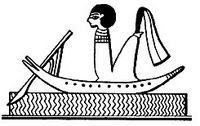Moore's Care of the Soul continues as guide
"The enormous popularity of spiritual writing in the past few decades is a broader sign of interest in spirituality. Thomas Moore’s The Care of the Soul was on The New York Times nonfiction bestseller list for years. Kathleen Norris’s Dakota and her Cloister Walk made the same list. Both authors drew on Catholic sources, although only Moore had a Catholic background (he had been a Servite friar). His work had a largely Jungian patina. Norris, a Presbyterian, used monastic sources to introduce her contemporary audience to the teachings of traditional Christian spirituality."
Also this week, Lt. Cmdr. L.E. Peterson, in his regular feature Chaplain’s Corner for dcmilitary.com, writes about a Washington Post (free registration required) article called "The Inside Out Solution" by psychotherapist and business psychologist Douglas LaBier. It appeared on the front of the paper's Health section Tuesday 14 February, 2006. LaBier says peace of mind doesn’t come from balancing home and work, rather the focus needs to shift to "getting your inner and outer lives in sync." The transcript for LaBier’s online session about balancing public and private life is also available online.
In his response to LaBier’s comments, Peterson writes,
"Nowhere in the article did he use the word Spirituality or Spiritual Life, but these are the religious traditions that have connected the inner (spiritual) self with the outer (worldly) self for many generations. Amazingly, spiritual traditions are focused on Meditation and prayer, Relationships (connections with others), Healthy living, Music/Art/Nature as blessings of creation, and Serving God and the world...Peterson urges readers to tend the roots of their lives. This seems to guide attention in the right direction.
"Many books have been written through the years on Spirituality and its disciplines. Back in 1940,* Care of the Soul: A Guide for Cultivating Depth and Sacredness in Everyday Life was written by Thomas Moore. The book focused on recognizing and cultivating our soul/ spirit/ inner self. It recognized that when our spirit is cared for and nurtured, then our ability to cope with the "things" of life is improved. It is well worth your effort to read his book."
*Note: Thomas Moore was born in 1940. Care of the Soul was published in 1992.


